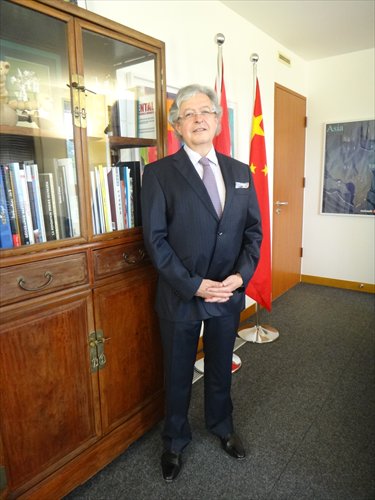Swiss ambassador advises Chinese to make informed decisions

Swiss Ambassador to China Jean-Jacques de Dardel Photo: Yin Yeping/GT
Sino-Swiss relations have come a long way since Switzerland became one of the first European countries to establish diplomatic relations with China in January 1950. This year has seen a series of events to celebrate 65 years of relations, while in the meantime, the Chinese enthusiasm for traveling to Switzerland is on the rise.
The Global Times set up an exclusive interview with the Swiss Ambassador to China Jean-Jacques de Dardel, who shared his views on how Switzerland's medical and banking industries impact China.
GT: The Swiss National Bank announced on January 15 that they would scrap a cap in the value of the Swiss franc against the euro, triggering turmoil on the currency market and soaring product prices. Media reports speculated that this will affect the amount of Chinese tourists that go shopping in Switzerland. What's your view on this?
de Dardel: That view is totally wrong. The unpegging of the Swiss franc is something which has affected the exchange rate between the euro and the Swiss franc, but it has not affected the exchange rate between the Swiss franc and other currencies. The Swiss franc soared in value against the euro, and it's true that this is a problem for Swiss industries and Swiss services selling to the eurozone because our products have overnight become 18 percent more expensive. Most Chinese tourists who come to Switzerland earn their money in Chinese yuan. The exchange rate between Chinese yuan and Swiss franc has gone in a direction which is favorable to Chinese tourists. When I came in to office over a year ago, a Chinese individual needed over 700 yuan ($112.8) to buy 100 Swiss franc. Now he needs 660 yuan.
GT: This March, Swiss medical authorities claimed that there is no scientific evidence that suggests that sheep placenta has anything to do with anti-aging, and therefore this kind of treatment has been abstained, but many Chinese are still traveling to Switzerland for it. What's your view on this?
de Dardel: We have a lot of world-standard clinics and hospitals which are among the best in the world. This, coupled with the fact that the Geneva lake region and the Basel region have become world leaders in bio-tech and med-tech development, has positioned Switzerland as a world health center. So this has attracted a lot of newcomers to new treatments and practices and some of them are probably geared more toward commercial interests than toward healing the human body. So our regulators try to regulate that. According to our stringent rules and approach to new medical findings, devices and products, things are going to be safe and all right. In some incidents, foreign interests that established their bases in Switzerland probably abused the system by offering products and treatments which may not be backed by health officials. I advise everyone to research the credentials of each and every clinic that opens in Switzerland and choose the ones that are recognized by our health authorities.
GT: Geneva's public prosecutor launched an investigation regarding 29,000 Chinese people that were robbed by a Swiss-based company and associated firms. Do you have any suggestions for the Chinese about managing their money in Swiss banks?
de Dardel: Switzerland remains what it has been for centuries: a world banking financial power based on its own credentials and knowledge of that field. So you can go on trusting the savvy, the quality, the knowledge of fund and money managers, our banks and our financial institutions. But Swiss banks also attract dubious characters who want to benefit and profit from the Swiss quality reputation and who do not always abide by the law. In the case you mentioned, to my understanding, these are foreign people who established their base in Switzerland, but behind our regulations. They have not been approved by our regulator. Once we know that they exist, there will be a clamp down.
If you are investing your savings, be aware of too-good deals like the one in this case [of which the company promised the return of] 10 percent a month and 120 percent a year.